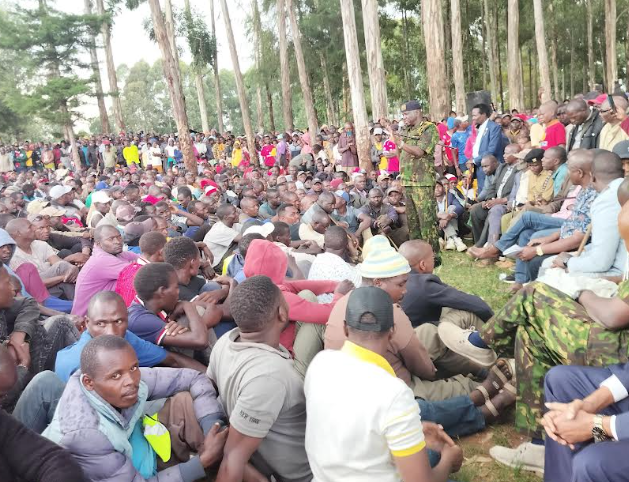 Police IG Douglas Kanja addresses residents of Angata Barrakoi./FILE
Police IG Douglas Kanja addresses residents of Angata Barrakoi./FILE
A group of opinion leaders from Bomet County has accused Kipsigis politicians and elders of misleading their community over a long-standing land Angata Barrakoi land in Transmara South, Narok County.
Speaking during a press briefing in Bomet town on Friday, the leaders — led by activist Wesley Langat, popularly known as Kocha Silibwet — called on Kipsigis leaders to stop inflaming tensions and instead tell their people the legal truth about the contested 6,300-acre parcel known as Transmara/Moyoi/2, located in Angata Barrikoi Ward.
“It is unfortunate that instead of guiding their people with facts and lawful counsel, some leaders are encouraging continued occupation of land that, according to existing legal documentation and multiple court rulings, does not belong to them,” Langat said.
The land has been the subject of a bitter dispute between the Kipsigis and Maasai communities for over three decades.
The Maasai, under the Ongata Barikoi Farmers’ Cooperative Society, claim ownership based on title deeds and a series of court judgments. The Kipsigis, through the Angata Gaa Cooperative Society, continue to live on and cultivate parts of the land, citing ancestral ties and long-term occupation.
Langat emphasized that the matter has already been decided in court — seven times — with rulings consistently favoring the Maasai community.
“The Kipsigis lost all seven cases in court. Yet some leaders continue to politicise the matter, instead of helping their people transition peacefully and lawfully,” he said.
Efforts to promote harmony led to an out-of-court agreement between elders from both sides, allocating 1,500 acres to the Kipsigis as a gesture of goodwill. But Langat expressed concern that the deal, once seen as a breakthrough, is now being undermined.
“Why are some leaders now pushing the community to reject a deal they had already accepted? What changed, and who stands to gain from renewed hostility?” he questioned.
Tensions escalated on Monday when a government-led land demarcation exercise — conducted under a court order — was violently disrupted.
The confrontation left five people dead and several others, including police officers, injured. While early reports described the clash as a tribal conflict, Langat dismissed this narrative.
“This wasn’t about ethnicity,” he said. “It was about the enforcement of lawful decisions and the manipulation of emotions by self-serving politicians.”
Langat accused some leaders of using the issue to build a political profile.
“They must stop using this crisis to craft a kingpin image. It is shameful to politicise such a sensitive issue,” he said.
Langat defended former Narok Governor Samuel Tunai, saying he served all communities and helped create employment, including for Kipsigis youth.
A local Kipsigis administrator, speaking on condition of anonymity, echoed Langat’s concerns.
He admitted that elders know the land doesn’t legally belong to them but have avoided telling the truth to avoid backlash.
“The elders know the truth. But they fear being seen as traitors by the youth, who are determined to keep fighting—even if it’s a lost cause,” he said.
Youth leader John Korir called for calm and urged leaders to de-escalate tensions.
“Let us not allow politics and misinformation to destroy the fabric of our society. The future of our children matters more than any political ambition,” he said.
















